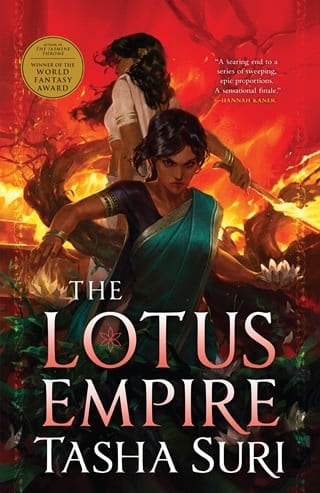Chapter 6 Malini
MALINI
Lata had been visibly troubled for days. When she and Malini were crossing the mahal’s grounds she finally spoke her mind.
“I think the path of war is unwise,” Lata said. Her voice was a whisper, but it was firm.
Malini gestured a hand at the attendants around them. The maids carrying parasols whisked themselves away. The guards, gold-helmed and armed with sabers, bowed their heads and stepped back, leaving Lata and Malini in relative privacy.
Without the shade of parasols, the sun bloomed hot against Malini’s shoulders. She met Lata’s eyes, squinting against the light.
“Continue,” Malini urged.
“Your allies have survived a terrible war. Your victory against Chandra came at a high cost. To you, and to them. To turn your strength on Ahiranya now—to draw your allies into another battle…” Lata shook her head. “You risk their loyalty,” she went on. “And you risk the empire’s survival.”
“What would you have me do instead?”
“Wait,” Lata said immediately. “Give them time. Give yourself time. We don’t truly yet know what threat faces you from Ahiranya. Why not gather your strength and wait for more information?”
“ More information? Every day I receive new messages telling me the rot is spreading. Every day you tell me that the empire will soon be at risk of a famine if the rot eats its way through our crops before harvest. You call war unwise, but how can I risk waiting to learn more?”
Lata lowered her eyes and said, quietly, “No matter what the priests may say, we’ve seen no yaksa. Will you take your followers to fight ghosts? Trees? What will they say when they reach Ahiranya and meet no enemies? The Ahiranyi have no army.”
“No army that we’ve seen,” Malini corrected, but she knew what Lata was saying was true. When Malini had summoned Priya to join her in the fight against Chandra, Priya had come with only the sparsest retinue. Herself. Her friend. A handful of men. Ahiranya was weak in manpower.
But the Ahiranyi— Priya —did not need an army to be a formidable foe. Priya had raised a whole river with her hands. She’d cracked and roiled the earth.
Malini had seen the power of a temple elder. She could not even imagine what a yaksa, with greater power still, would be able to do to her people.
“My followers will meet enemies,” Malini said with certainty. “Whether we find the yaksa or not… we’ll meet something at Ahiranya’s borders. I am sure of that.” An edge of humor touched her voice. “Besides, you would be wise not to underestimate Ahiranya’s trees, Lata. They’re more effective than many a soldier with a sword.”
Lata didn’t seem to find that funny. Her mouth was pursed into a worried line.
“If you’re wrong…”
“I’m not,” Malini said. “Lata, I do not discount your advice. I trust in your guidance. But I cannot avoid this path. I can only seek to prepare for it.” She was fairly certain her maids and guards were not close enough to hear. But she still lowered her own voice further. “We have one weapon that may kill the yaksa. Only one.” The memory of fire on the battlefield—strange, unnatural fire—lurched through her skull. “If we can raze Ahiranya with flame, there will be no need to prepare for a protracted war. Parijatdvipa will be safe.”
Lata raised her head.
“And if the fire is not enough?” Lata asked. There was real fear in her face.
“Then at least we will know,” said Malini. “And we will use what time we have to prepare and find another way to win.” She filled her voice with steel. “We will win, Lata.”
After a moment, Lata nodded.
Malini waited. When Lata remained silent, she began walking again. A heartbeat later, she was under the shade of parasols once more. Her guards were walking alongside her, a wall of steel and armor.
She entered the temple.
Her real grief had been folded away. She’d allowed herself tears and trembling weakness on the day of Aditya’s funeral, but that was done now. She’d make sure of it.
Every day, she dressed in white: a sari the color of ivory, brocaded in silver-white thread. Her jewels were pale gold, moonstones, and pearls. And every morning, she worshipped as her mother had once taught her to worship, laying garlands at the feet of the statues of the mothers of flame. She prayed with her hands clasped, reciting their names over her prayer stones. Nanvishi, Suhana, Meenakshi, Ahamara. Divyanshi, her own ancestor.
And then—unlike her mother, or any woman who had come before her—she laid garlands at the feet of three new effigies. Two women wrought from silver: Alori and Narina, her heart sisters, the women who had burned at her brother Chandra’s orders, burned when Malini had refused to. And finally, the statue of a man.
Aditya.
The first statue wrought of Aditya had been carved from gold. One of the finest artisans in Parijat had presented it to her, drawing back the cloth concealing it with a flourish. It had been hastily but skillfully cast, with her brother’s particular strong nose and even, serious brows. Her brother’s effigy had been garbed like an imperial crown prince, in a rich tunic that had billowed into flames at his knees. A symbol of his death and his immortality.
The statue had not possessed eyes. Until the eyes were carved in place, it would not become an idol for worship, complete and holy, to be garlanded and wreathed in incense. It was just molded gold.
Malini had looked at its empty, glorious face and hated it with all the spiteful breath within her.
“Melt it down,” she’d said.
The man had bowed low to the floor, stammering apologies. He had not meant to offend the empress. The High Priest had asked him specifically to create a likeness of the prince. The High Priest had insisted—
“ Destroy it ,” Malini had ordered again. There, before her entire court, trembling upon her throne.
Shaking. Her hands had been shaking. She had laid them on her lap, one over the other, forcing them into stillness. “Melt it down,” she’d said again, with a calmness as hard as a blade, a calmness bitter with fury. “And I will select an artisan to remake his likeness.”
“Empress,” an advisor had begun tentatively. But she had not allowed him to continue.
“He was my brother. He died for the good of my empire. I will see him properly honored.”
And mothers help her, she had tried. She truly had.
Instead of gold, the statue that stood before her now was wood, lacquered to a dark sheen. Wood from a monastery garden to the nameless, offered up by his fellow priests. The statues of Alori and Narina stood in a private alcove, veiled in white cloth. But the statue of Aditya stood at the side of the mothers—close in standing to his own ancestor Divyanshi.
The effigy was complete and holy, with her brother’s gentle, piercing eyes. His soft, faintly curling hair, pinned back. His brows like her own, and his smiling mouth. She had not allowed this statue of him to be dressed as a crown prince. Instead he was a nameless priest—garbed in folds of cloth, chest bare, palms open.
She kneeled, laying her final garland before the effigy of her brother. She closed her eyes and thought of nothing, and consciously felt nothing—only the cold marble beneath her knees, and the weight of the jewels in her hair. She held her position for a long moment, and then, with a final bow of reverence, stood.
“Empress,” Lata murmured behind her, and Malini turned.
Hemanth was waiting for her at the temple entrance. His jaw was tight, his mouth compressed. He bowed deeply to her.
“Empress,” he said.
“High Priest,” she said, inclining her head mildly in return. She walked toward him, skirts whispering against stone. “Are my advisors waiting?”
“Everything is ready,” he said.
“I am honored,” she said to him, in a voice that was low and warm, as if she liked him, “to have your guidance in this task.”
“It is my honor.”
I know how you hate me , she thought, and had to hold back the smile that threatened at her own mouth; that vicious thing, all teeth.
Instead she said, “You may walk with me.”
Chandra had carried out his executions on pyres. He had burned women in the mahal’s gardens. He had burned them in his own court.
But Malini would not do as he had done.
Her executions would be cleaner.
A training courtyard for the imperial guard had been commandeered, and men had been set at the entrances for privacy. Her generals stood waiting for her, beyond the shade of the veranda reserved for her throne: Lord Khalil of Dwarali, and Lord Prakash of Srugna; Lord Narayan of Saketa and Prince Rao of Alor, who refused to meet her eyes—who stared into the distance with golden sunlight a swathe and a mask across his face. Hemanth moved to join them, standing in the last dregs of shade thrown by the veranda’s columns. He had not asked if he could stand beside her in the shade, and she had not offered.
In the center of the courtyard kneeled ten men. They were all highborn and dressed in their finery: silk turbans pinned with jewels, sashed tunics. They had no weapons at their sides. They had lost that privilege, along with the privilege of a long life. Their hands were bound in chains, each chain looped to the next man’s cuffs, to keep them all imprisoned in place.
In her father’s day, executions had been a spectacle. There had been a grand execution ground and a mingled common and highborn audience gathered together to watch the parade of traitors and their just deaths: by dozens of arrows, or an elephant’s foot to the skull, or the neat cut of a blade to the heart or the throat. Malini had never witnessed those executions. It had never been considered appropriate for a gently raised imperial woman to view such things. But she had asked Aditya once what it was like.
He’d looked pained, a little haunted, but she had pushed him until, reluctantly, he had spoken:
“It was terrible,” he’d said. “Terrible, and I was not allowed to look away. I don’t understand how people chose to look upon it for sport.”
Today, she would not ask her allies to look upon sport, and she would not inflict it on the men who were fated to die.
For her traitors, Malini had ensured privacy and a sharp sword. For herself, Malini had ensured the shaded veranda and the presence of her closest advisors. Raziya and Deepa and Lata stood beside her.
Malini nodded her head.
One of her officials cleared his throat in response and in a clear voice announced the crimes of the kneeling traitors and their fate.
Loyalty to a false emperor. The murder of Parijati women. Refusal to serve the righteous empress, the chosen of the mothers. Treason. Treachery.
There could only be one punishment.
Malini stared, unblinking, as a warrior stepped forward and—without further ceremony—slit the first traitor’s throat.
It was meant to be a clean death, but death was never clean, and certainly never bloodless. There was a rasping, wet sound as the saber was drawn across the man’s neck. A splatter of blood, as it spurted in gouts from the wound of his throat. His body collapsed with a thud.
The two men kneeling beside him were drenched in his blood, their eyes closed and their faces gray. One leaned forward and heaved against the ground, retching dry. She had not ordered that he be denied food, but perhaps he had denied himself.
Her warrior moved to the next man. Another thud followed. Then the third.
The fourth along was the first to snap. He wrenched forward, heedless of his chains, dragging the other highborn traitors—dead and living—forward with him. “Empress,” he called out, his voice wretched. “Empress, please, spare me. Spare us.”
The warrior stepped toward him. Malini raised her hand.
The executioner paused.
“Lord Sushant,” she said. Her voice was a void—not calm, but serenely empty. “Why do you believe you should be spared?”
“We acted as we thought was right,” he stammered out, trembling, blood a slash of color beneath his sweat and tear-damp eyes. “We were trying to be good highborn men. Empress, please—”
“And yet you acted against the will of the mothers, Lord Sushant,” Malini cut in. “I am their chosen. Do you deny it?”
“N-no, Empress. No, never.”
“My generals and advisors and the warriors who fought on my behalf died because of the false emperor Chandra,” Malini said, with that same terrible calm. “They paid with blood and with coin. Many of their kin paid with their lives. Should they suffer without justice?”
“Mercy,” he whimpered. “E-Empress, you are not Emperor Chandra. Your brother w-was a monster. I admit I feared to gainsay him. But you, Empress, you must have some compassion—”
“Must I?”
Something in her voice finally quieted him. He gasped wetly, silent now, staring at her.
“I am not either of my brothers,” Malini said. “I am what the mothers of flame require me to be. And they do not require the softness of mercy. They do not require compassion. They require a leader who can face the enemy that awaits us, and loyal men to follow her.”
“I can be loyal,” he said. “I—I—”
“You cannot be trusted, Lord Sushant. This, I assure you, is mercy enough.”
She gestured—a twitch of her hand.
The executioner swung his blade, and Sushant was dead.
She left Hemanth to the task of tending to the bodies. She had insisted he do so personally. Once, you knew these men, as you knew my brother Chandra , she had told him. They deserve the honor of your care.
He had agreed. Face pinched. Knowing, no doubt, how much she wished he could be dead beside them.
But Hemanth had too much sway among the priests of the mothers for her to kill without consequences. He had been High Priest since long before her birth. And of course, he had proven useful to her. He had legitimized her claim, after all; he had kneeled before her and called her empress, condemning Chandra.
The brother he’d loved and served, and burned countless women alive for.
Hate and pragmatism warred in her heart. But pragmatism was stronger, in the end. Better to keep Hemanth alive and under watch where he could be useful to her. Better to make all her would-be enemies into weapons she could wield for her own gain.
Lata walked with her into the mahal’s prison cells. They said nothing to each other as they entered dimly lit corridors, but Lata’s expression showed visible relief at the welcome coolness and quiet of the prison, where nothing smelled of blood—only damp, and stone.
Prisons were not naturally quiet, but the men housed here had done nothing but pray from the moment they were locked away. They were men used to internal and external discipline. Their shadow-shrouded bodies through their cell bars were all arranged in meditation, spines straight and heads upraised, legs crossed beneath them.
She stopped before one cell. And in the dim shine of filtered sunlight, the soft glow of a single oil lamp, she saw the deep blackness of a warrior priest’s eyes; they widened as they met her own.
“Empress,” he rasped.
Around her—from the other cells—she heard a rustle of movement. Murmuring voices.
“Priest,” she said. And Lata, with a voice sharp as a whip, said, “Bow to your empress.”
The man rose from his crouch and bowed. She caught another glimpse of his face as he did so, and his eyes were burning with feeling. Not hatred, exactly—but a directionless fervor, a faith without a path or a leash.
Malini could give him that path, if he allowed it.
“Priest,” she said. “Rise.”
He did.
“I did not expect to be blessed with the presence of the empress,” the man said. His expression was guarded. “I thought for a time you would die without passing judgment on my brothers and me.”
Loose lips, made looser by darkness and loneliness and the isolation of four walls. She remained silent, letting him pour out words like blood from a wound.
“Even here, we heard how grievously the Ahiranyi bitch injured you, Empress,” he said, his voice a vicious rumble. “The mahal has been under a pall, waiting for two imperial funerals, or three.”
“A servant of the yaksa could not kill me,” she said coolly. “The mothers intend a higher purpose for me. They always have.”
He inclined his head.
“What is your judgment?” he asked. “When will my warrior brothers and I die?”
“You will not die today, or tomorrow,” she said. “I have not deemed it your time. Not yet.”
She’d spoken of prices that had to be paid, and of justice, when she had condemned Sushant and what remained of Chandra’s council to death. As if she could afford to be even-handed. As if she could judge all her enemies equally and kill them with a swift and impersonal blade.
She could not. More than a simple knife to the heart had taught her that.
“Does the empress hope I will beg for my life? I will not. I regret nothing I did,” he said, with exhausted defiance.
“I understand,” Malini told him. “Certainly, you acted righteously. You believed my brother was meant to rule. You believed it was my fate and my duty to burn. You acted in the service of your faith. How could you do otherwise, when my brother wielded something that appeared to be mothers’ fire? I understand, and I cannot fault you,” Malini went on gently, even though she felt nothing for him but disgust—a coiling, oily feeling in her chest. “But still, you defied the will of the mothers. You acted in a way that could have condemned all of Parijatdvipa. The yaksa are here. I have heard reports from across the empire of rot worsening. And I, priest—I am the cure.”
A dry, bitter sound escaped him. It might have been a laugh.
“Let me die with dignity, Empress,” the man said. “I will not beg. But I ask.”
“There is no dignity in death,” she said bluntly. “Not for you, priest. Nor for your brothers. But there is dignity—and redemption—in using your strength to shape a Parijatdvipa worthy of the mothers of flame. A Parijatdvipa that will survive the yaksa and crush them beneath its great heel, its righteous fire.
“Live,” she said. “Vow to serve me, and fight the yaksa on my behalf. Vow it on the death of Prince Aditya,” she went on, her voice not even wavering over the candle-flicker of grief that refused to extinguish, that ever burned in her. “Vow it on your faith.”
His stare was unwavering.
“We still believe you will burn, Empress,” he said. “That you must burn. No vow I make upon my faith, no promise of service, will change that truth. If you will not accept it, then let me die. Let us all die, so we will not see Parijatdvipa’s end.”
“Is it for you to decide when I burn? Arrogance,” she snapped. “I am Divyanshi’s scion. I am her chosen. It is not for you—or any priest—to decide when I shall die. I will know just as my brother Aditya knew.”
Her words were a knife. Now she took away the sharpness and left only the weight.
“I know my worth,” she continued, in a low voice that carried across the prison like a deep undertow—a thing with impossible gravity. “I know my fate and the journey that lies ahead of me. You have listened to false men, priest. Now listen to me. Hear me, and serve.”
She saw the words land—saw them like a hook in the mouth of a fish, catching him fast.
“Will you serve?” Malini asked again.
His breath shuddered from him.
“Will I be believed, Empress? Would you believe any of us?”
“Yes,” she said simply. “I know your nature. I give you this chance not out of mercy but because of one truth: A priest died to save me from the yaksa. Priests of the mothers are my allies by nature, by duty, by fate. I believe in this. So. Will you fight for a glorious Parijatdvipa, where the yaksa lie dead, where we rise—or will you die here, forgotten?”
He said nothing. But the silence from the cells around her was weighty. Thoughtful.
She waited. Her hands ached with the promise of a weapon that was almost hers to use.
“I will allow you all time to consider,” she said. “But when I return, I will seek your vow. A blade in your hands, or a blade to the throat.” A blade in my hands, or a blade I must break. That is what you are. “Tomorrow I will be turning to Ahiranya. And a new war will begin. You may come, and fight. Or not.”
She walked away as his mouth parted; walked away knowing what answer she would receive.
“Do you consider this unwise too, Lata?” Malini murmured as they emerged from the darkness.
“I think perhaps this isn’t a time for wisdom,” Lata said just as quietly. “Perhaps wisdom and war cannot go hand in hand.”
Malini laughed, mirthless. “A sage’s answer,” she said. “I suppose we’ll see soon enough.”
 Fullepub
Fullepub 



